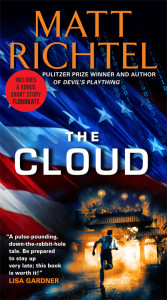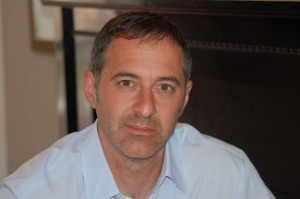by Matt Richtel
TKZ is once again delighted to host Pulitzer prize-winning author Matt Richtel. His latest release, THE CLOUD, just hit bookstores, and I can personally highly recommend it!
This true story ends with me sobbing. In public.
 The story starts five weeks ago, on a Monday night, with a text. I was amid an exciting time, working on a front-page story for the New York Times (my day job) about a controversial new twist involving computers and schools, and I was preparing for the Jan. 29 release of my new thriller, The Cloud.
The story starts five weeks ago, on a Monday night, with a text. I was amid an exciting time, working on a front-page story for the New York Times (my day job) about a controversial new twist involving computers and schools, and I was preparing for the Jan. 29 release of my new thriller, The Cloud. The text came at 8.06 p.m. It read: “Call me.”
The text was from Adam, a good friend of mine and editor at The New York Times. About a year earlier Adam had been put in charge of a group of eight, mostly veteran reporters, including me. The group was called “How We Live,” and its charge was to make a journalistic beat of the way people live their lives; how we eat, sleep, learn, fight, procreate, and how we die.
We were supposed to be a new generation of newspaper story tellers – part of an overall move in the newsroom to infuse stories with narrative, voice, and character. The days of authoritative top-down explanations in the New York Times were increasingly giving way to showing and not telling, and sophisticated story telling, appealing to heart not just head.
We were responding to the need to capture and keep reader attention amid the white digital noise of an Angry Bird world.
In response to Adam’s text, I called him. Before I tell you the shocking news he told me, please indulge some additional, necessary, backstory.
Over the last year, my fiction career was also evolving to suit the digital world. Like many thriller-writing peers. I was writing more and more, adding to the already heavy book-a-year-load.
In August, I published a short story, Floodgate, 15,000 words I hadn’t anticipated writing, aimed at staying in touch with an audience feeding from the all-you-can-tweet-buffet.
And I took hard to Facebook, something initiated as a marketing tactic, but that transformed also into a usually welcome labor, in which I write stuff my toddlers say (funnier than I could ever make up) and occasionally quip about story telling.
 I amassed some 20,000 Facebook subscribers on my personal page. And several thousand likes on my fan page. We got nice press for Floodgate. Apparent success on all fronts.
I amassed some 20,000 Facebook subscribers on my personal page. And several thousand likes on my fan page. We got nice press for Floodgate. Apparent success on all fronts.The New York Times stuff seemed to be working out too. The How We Live team killed it. Something like 35 front-page stories and 90 stories for the front of our feature sections, like Dining, Home, Travel. We generated a ton of traffic. We were a hit.
Then, fast forward to five weeks ago, I got the text. From Adam, on the Monday night. “Call me.” I called. In a nutshell, he explained, the paper was disbanding the How We Live group. And not just that; the paper was doing a whole bunch of shifting, all over the place. Voluntary buyouts, long-time editors and friends leaving, reorganization.
Why? Stating the obvious: because the paper’s news gathering operation – the news gathering and storytelling operation – cost too much. It was built in a different era, when our costs were supported by print advertising. Remember that old thing?
I’m no stranger to the ups and downs of the changing media landscape. I started and worked my way up from small newspapers, starting in 1990, at which I survived probably half a dozen rounds of layoffs. I know not to let macro-economic forces get me down.
But after I talked to Adam, I went into a tailspin. One that had been a year in the making, at least.
All this hard work. All this adaptation. So much terrible uncertainty. Part of what I experiencing, I am adult enough to know, was the personal uncertainty of the reality I’d need to find a new job inside the paper (I have), and that I was poised to have The Cloud come out (it did, two weeks ago). That meant marketing, travel, speaking, radio, and the subterranean terror that accompanies a book release: will only my family buy it?
But there was something much bigger for me too. I was confronting, squarely, for the first time, the reality that we don’t know what works. We.Do.Not.Know.What.Works.
What has value? How much value? Will we have mere chaos, only chaos, since Jack Dorsey, of Twitter, wrote his infamous missive: “…we came across the word ‘twitter’, and it was just perfect. The definition was ‘a short burst of inconsequential information,’ and ‘chirps from birds’. And that’s exactly what the product was.”
Inconsequential? Only if you’re not competing against it to pay the bills, and satisfy your muse.
My sleep deteriorated. I experienced a very unusual level of anxiety. I couldn’t write. I was a rotten dad. For two weeks, I felt like crud. I couldn’t find steady ground.
Then on a Monday, two weeks after the text, I took myself on a Monday afternoon to see Lincoln. No sooner had the opening music began to swell then I had tears in my eyes. They stayed there, persistently, throughout. And by the time a bereft Sally Fields dropped to her knees during a particularly emotional scene with Daniel Day Lewis, I began sobbing. Just lost it.
I was a mess the rest of the movie.
When I walked out, it was the best I’d felt in weeks. Cleansed.
And it’s when I finally understood the thing that had been eluding me for weeks, maybe for much longer. I finally understood the value of The Story. And of storytelling. And of its place in the digital world.
I’ll tell you first my conclusion, and then explain.
My conclusion: The bad story and story teller has little value, or, at best, ephemeral value; so too the mediocre story and storyteller, and even the merely good ones.
The great story and story teller is more valuable than they have ever been.
They are a port in the storm. A place to pause and heal from all the white noise the world throws at us, a tiny closet to cower inside and rest from the swirl of inconsequential missives.
And, more than that, great stories are the place where we will change the world. In Lincoln, Tony Kushner and Steven Spielberg, two of the greatest story tellers of our age team up to make a movie that is, perhaps above all, an homage to storytelling. They teach us that Lincoln used story-telling, narrative, anecdote, quip and emotion, to deliver the United States from slavery.
I know this doesn’t answer the business-model question. That’s the one that plagues us, still. Will the New York Times face bigger challenges? Yes? Will The Cloud take flight? Not as it might have when the institutions of publishing had more power (It is my most ambitious and mature and entertaining work to date).
But it’s not the business model question I needed an answer to. It was the emotional one, the real one. And I got that answer sitting in a movie theater, sobbing.
Fellow story tellers, take seriously your duty. The world seeks deliverance. You hold its key.
